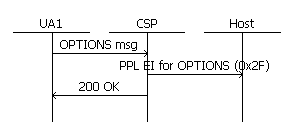
You are here: CSP Developer’s Guide: Internet Protocol > 5 Session-Initiation Protocol (SIP) Software > SIP Notifications of Options

Overview
The SIP stack can now report the receipt of SIP OPTIONS to the host.
Specification Built From
RFC 3261
Description
The SIP method, OPTIONS, allows a User Agent (UA) to query another UA or a proxy regarding its capabilities. This feature allows a client to discover information about the supported methods, extension content types with or without a dialog being established.
When the CSP receives an OPTIONS message, it is reported to the host as a PPL Event Indication including the Request URI in the message.
API Call Control Messages
PPL Event Indication (0x0043) message:
The PPL Event Indication supports the following TLVs:
• 0x2946 - SIP Request URI Password (New)
• 0x2947 - SIP Request URI Header (New)
• 0x2954 - SIP Request URI User Name
• 0x2955 - SIP Request URI Host Name
• 0x2956 - SIP Request URI Port
• 0x2958 - SIP Request URI Parameters
PPL Information
PPL Event (0x002F) in SIP Component 0x00A7 reports the received OPTIONS message.
API and CSA Configuring and Querying
This feature can be configured either using the API or CSA.
API Configuring and Querying
To enable this feature, set bit 8 of the PPL Event Notification Mask TLV (0x0282) in the VoIP Protocol Configure (0x00EE) message.
CSA Configuring and Querying
To configure and query the SIP stack for this feature, view the Configure SIP Advanced screen, Call Progress Notification, and select Options message recvd.
0x0282 PPL Event Notification Mask
Used in:
VoIP Protocol Configure message
VoIP Protocol Query message
|
Byte |
Description |
|
0, 1 |
Tag 0x0282 |
|
2, 3 |
Length 0x0004 |
|
4-7 |
Value[0-3] 32 bit mask with each bit selects specific
Bit 8 - Options message received. |
Call Flow

TLVs
0x2946 - SIP Request URI Password
Used in:
PPL Event Request message
PPL Event Indication message
|
Byte |
Description |
|
0, 1 |
Tag 0x2946 |
|
2, 3 |
Length Variable (maximum 20 bytes) |
|
4-n |
Value[0-n] Null-terminated ASCII string |
0x2947 - SIP Request URI Header
Used in:
PPL Event Request message
PPL Event Indication message
|
Byte |
Description |
|
0, 1 |
Tag 0x2947 |
|
2, 3 |
Length Variable (maximum of 650 bytes) |
|
4-n |
Value[0-n] Null-terminated ASCII string |
0x2954 - SIP Request URI User Name
Used in:
0x0033 NPDI Universal ICB in:
Route Control message
Request for Service with Data message
|
Byte |
Description |
|
0, 1 |
Tag 0x2954 |
|
2, 3 |
Length Variable (maximum of 40 bytes) |
|
4-n |
Value[0-n] Null Terminated ASCII for user name in Request |
0x2955 - SIP Request URI Host Name
Used in:
0x0033 NPDI Universal ICB in:
Route Control message
Request for Service with Data message
|
Byte |
Description |
|
0, 1 |
Tag 0x2955 |
|
2, 3 |
Length Variable (maximum of 80 bytes) |
|
4-n |
Value[0-n] Null Terminated ASCII for host name in Request
|
0x2956 - SIP Request URI Port
Used in:
0x0033 NPDI Universal ICB in:
Route Control message
|
Byte |
Description |
|
0, 1 |
Tag 0x2956 |
|
2, 3 |
Length 0x0004 |
|
4 |
Data[0] MSB Port in Request URI Data[1] : Data[2] : Data[3] LSB Port in Request URI |
0x2958 - SIP Request URI Parameters
Used in:
0x0033 NPDI Universal ICB in:
Request for Service with Data message
Route Control message
Outseize Control message
|
Byte |
Description |
|
0, 1 |
Tag 0x2958 |
|
2, 3 |
Length Variable (maximum of 650 bytes) |
|
4-n |
Value[0-n] Null-terminated ASCII string |
Important! All TLVs except the port number TLV ends with a NULL terminator, therefore the actual data supported is one less than the maximum length supported for the TLVs. Also note that the CSP nacks all SIP requests of a size greater that 1500 bytes with the 513 message, Too Large